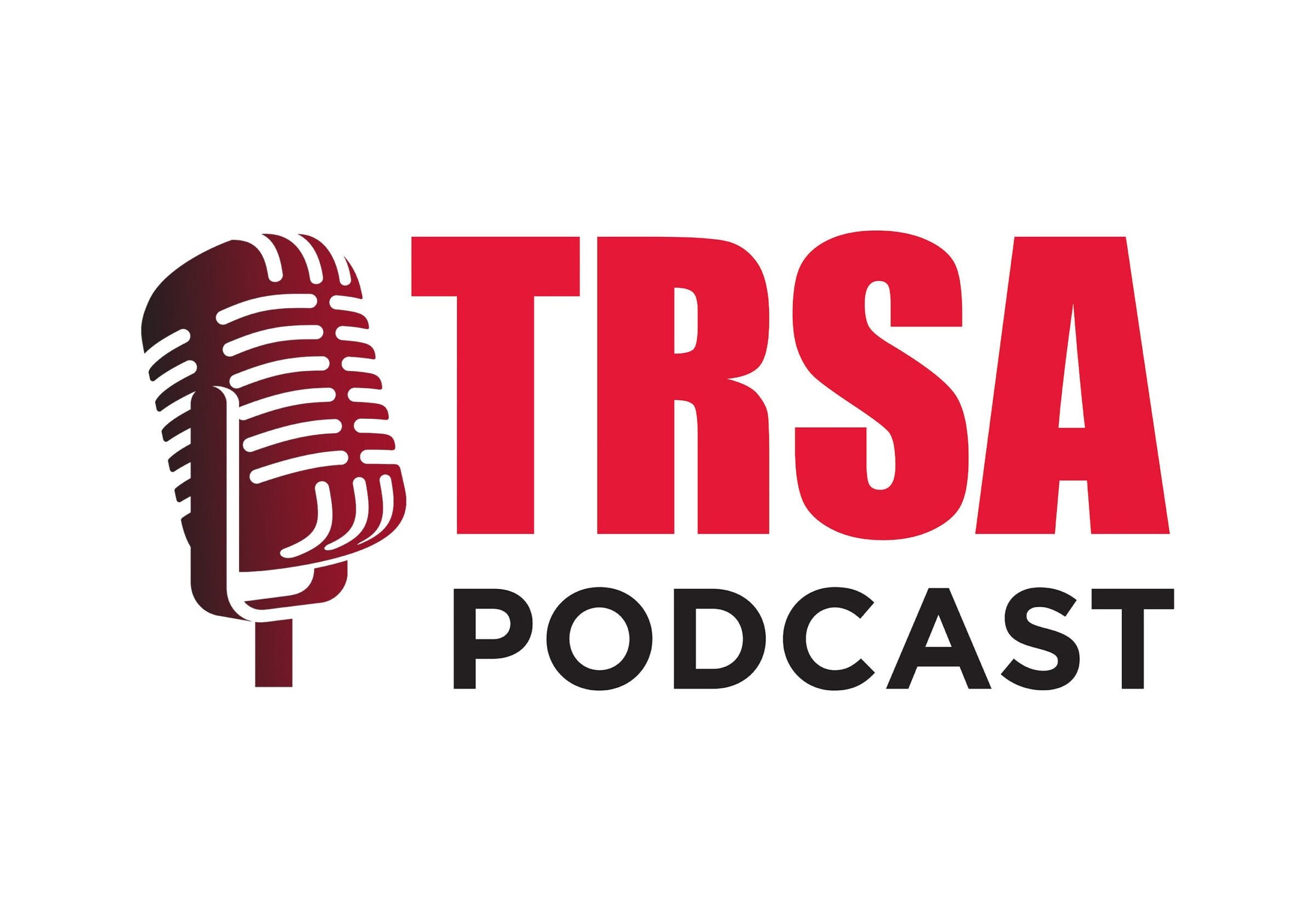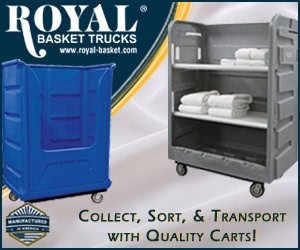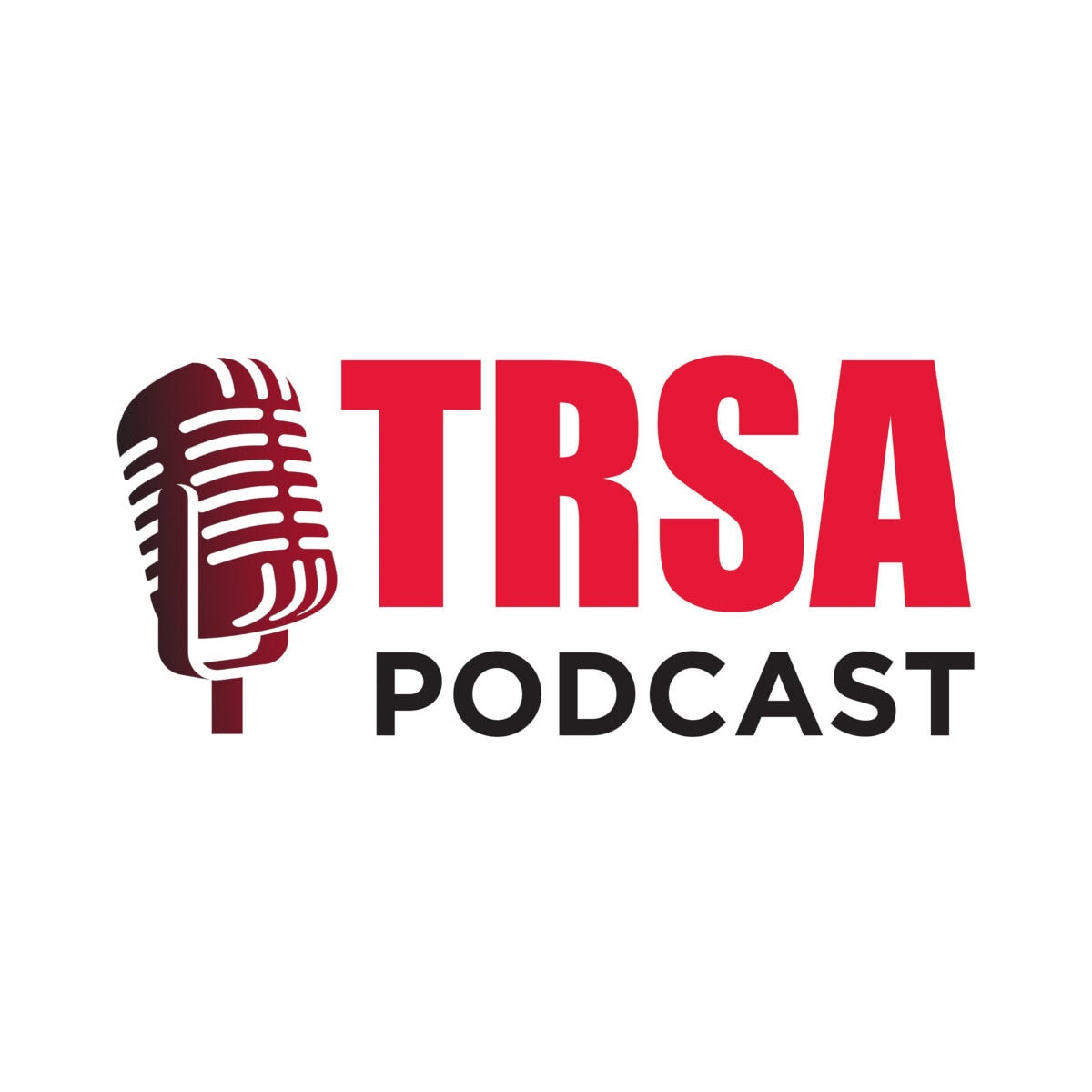 TRSA Chair Randy Bartsch, Ecotex Healthcare Linen Service, Vancouver, British Columbia, discusses his goals for the association and the industry during his two-year term as TRSA Chair, the association’s expanded advocacy efforts in Canada, the benefits of certification, developing the next generation of industry leaders, healthcare trends and more.
TRSA Chair Randy Bartsch, Ecotex Healthcare Linen Service, Vancouver, British Columbia, discusses his goals for the association and the industry during his two-year term as TRSA Chair, the association’s expanded advocacy efforts in Canada, the benefits of certification, developing the next generation of industry leaders, healthcare trends and more.
Jason Risley: I’m Jason Risley, the host of TRSA’s Linen, Uniform and Facility Services Podcast. Thanks to TRSA Chair Randy Bartsch for joining me on today’s episode. A long-time healthcare laundry executive, Bartsch is currently the chair of Ecotex Healthcare Linen Service in Vancouver, British Columbia. During our discussion, we talked about a wide range of topics, including his goals for the association and the industry during his two-year term as chair of TRSA, TRSA’s expanded advocacy efforts in Canada, the benefits of certification, healthcare trends and more.
Randy, thanks for joining me today, and thanks for your leadership of TRSA. You took over as TRSA chair in September 2024. What are your priorities for the association during your two year term?
Randy Bartsch: Thanks, Jason. Yeah. So September, it seems like a long time ago with everything that’s going on in our world.
But, in terms of my priorities for my two-year term, I guess my top priority is really to continue to reinforce TRSA’s role as the voice for the industry, especially in policy advocacy, workplace development and generally just kind of promoting our industry’s essential services and the role that we play in the communities that we serve. You know, obviously I’m trying to champion innovation and sustainability. The industry’s certainly evolving fast. We see, you know, AI, digitization, automation, robotics. You know, a lot of things are out there since, and really kind of transforming the way each of our companies operate.
You know, I think TRSA is an important platform where members can come and learn from each other, you know, embrace innovation, and understand what’s happening in the world outside of their own markets. I think we’re doubling down to support clean technologies, sustainable water and energy use, and, you know, generally, the things that impact our cost of doing business. TRSA is also about developing and fostering leadership and leadership development. Programs that we have for our young executives, women in textile services, and other industry-specific committees, I think are good because it helps us reach into the next generation. So I’m very pleased with what TRSA has accomplished.
I really like to see us continue to add value, I guess, as a way to kind of sum it up. You know, at the heart of it all, I think my key priority is to make sure that TRSA continues to unite, serve and kind of elevate our industry.
Jason Risley: You’re a long-time member of TRSA and a long-time member of the Board of Directors as well. What value does TRSA provide to its membership?
Randy Bartsch: That’s a great question, Jason. You know, I really want to reinforce for our listeners, TRSA’s, not only mission, but its practical benefits. You know, I think advocacy really matters. TRSA is really a leader when it comes to both dissecting emerging or potentially emerging government regulation and understand how it could and may not affect our industry, but particularly when it comes to labor laws, environmental rules, safety standards or even changes the way different regulating bodies deal with those things. TRSA has been a great source for providing understanding and uniting us to combat things that maybe have unintended consequences for our industry.
Individually, we can’t do the heavy lifting that is required in Washington or, you know, various state capitals. But TRSA comes alongside and helps us, you know, present our industry and address the issues that impact us. Supporting that is also our certification programs, which helps make sure that our users operate with integrity the way that we can help make a difference to their businesses, and training and development, helping that next generation. Some of the specific support areas of our operations are engineering teams and service and sales teams, giving them the skills to, help them succeed and do a better job, representing their companies and representing our industry. The development tools and training programs are essential for TRSA’s success today and tomorrow.
And lastly, I’d like to touch on benchmarking and best practices. If we don’t have to guess how we’re doing against our peers, but TRSA really provides the data to compare our performance, safety and service standards against what’s happening broadly in the industry. And I think that’s powerful stuff when it comes to trying to improve and really justify investments that we’re making.
Jason Risley: You had mentioned advocacy efforts. TRSA recently formed a government relations working group to focus more on advocacy efforts in Canada. How important is it for TRSA to expand its outreach in Canada?
Randy Bartsch: I want to highlight TRSA’s growing international relevance, not only in Canada, but trends and developments, across our Western world impact us in ways that we don’t always see. We have, you know, lots of dialogue recently around tariffs. And I think we’re only now beginning to understand how our industry, which is really fundamentally a local service industry is impacted by global trade. We buy our textiles from around the world, purchase technology and automation, and there’s other advances that are happening and even things as simple as replacement parts for equipment that keep our plants operational.
What happens around the globe matters, and I think, TRSA is committed to serve its membership by staying abreast of these issues and helping create an environment of education and idea exchange amongst members. And one of those examples is, our recent effort to increase our advocacy for our operators that are doing business in Canada. I think it’s a natural step. Advocacy has always been a big driver, especially in the U.S. But as someone who’s based here in Canada, it deeply involves what’s happening here as well.
I can tell you that there’s a real demand for the same level of representation north of the border, as TRSA succeeded in Washington, you know, cross border challenges are real, issues like labor, labor regulations, sustainability standards, safety expectations, are just as important in Canada as they are in the U.S. But the rules and the decision makers are different. And that’s one of the roles that I think TRSA can play in terms of, providing working groups and understanding how to navigate those policies as they play out in Canada. TRSA members service 90% of the textile service industry in Canada. Many are cross border players.
There’s many communities, of course, that obviously have local owner-operators, but all of us can benefit from what TRSA does in terms of uniting the industry together to address some of these issues that, people get elected, don’t always think about our industry when they’re focusing on policy. And by providing that education, I think it really does make a difference. And as a Canadian and as TRSA chair, I love that we’re making this move, and I think that it tells our Canadian members and the big operators, multinational operators that are members, that we can provide something of relevance in terms of the advocacy on both sides of the border.
Jason Risley: As a company that operates both in the United States as well as in Canada, have you felt any of the impacts of any of these recent policies?
Randy Bartsch: Well, there’s a lot going on right now, obviously, and I think, you know, broadly, there’s a lot of uncertainty, Jason, at this particular time.
Hopefully, as we move through the next number of months, there’ll be a little more, understanding of, I guess, where things will settle out with regards to tariffs in particular, understanding how those things will impact us. You know, right now, there are situations where more for plants and equipment and supplies. But, we have a situation today where we buy a lot of equipment from Pellerin Milnor and that product is coming out of their facility near New Orleans. That’s now tariffed coming into Canada. And so those products now have a 25% disadvantage against other foreign options.
And so it really changes decisions and investment, you know, capital investment, decisions. And I know that anybody that’s operating in Canada or has a plant that they have in Canada, are faced with those same issues. For the first time, product coming out of Asia or product coming out of Europe, more importantly, has a distinct advantage. You know, that includes not only the washers or dryers or equipment in the plant, but also impacts replacement parts. And until we get some stability, we really can’t decide what investments or which manufacturers we’re going to switch to or need to switch to, to navigate this long term.
That broad level of uncertainty, and that’s just one example, needs to settle out before we really know what we can do. I think we’re fortunate because as an industry, we’re providing a service. And while it may slow down, reinvestment, we need to stay caught up. We need to stay caught up in automation. We need to stay caught up in reinvesting in our plants and equipment.
And, we’re not in a spot right now where anybody can do that with any certainty. We’re on a bit of a pause, for a period of time until we get that clarity that we can move forward.
Jason Risley: Yeah. The uncertainty in the way some of the tariffs have been rolled out and then also pulled back and then put forth again has to be difficult on the business community with all the uncertainty.
Randy Bartsch: Absolutely, Jason. And our industry isn’t top and center in terms of the development of those policies, obviously, but we are clearly impacted as those things happen. Once the rules are set, then I think we can adjust and adapt, but we’re not quite there yet.
Jason Risley: A few years ago, you had implemented a succession plan at Ecotex. And so to touch on some of the programs that TRSA has for developing leaders, how important are some of TRSA’s professional-development programs and institutes such as the Executive Management Institute and Production Management Institute in developing both current executives and then also future leaders in the linen, uniform and facility services industry?
Randy Bartsch: Well, look, I mean, I think our industry is a service business. It’s a people-driven business. Yes. Equipment matters. Technology helps, but at the end of the day, it’s great managers and leaders who’d really drive the performance culture, growth, and more importantly, the future of our industry.
You know, the people you meet through TRSA, whether it’s conferences or, you know, a summit or whether it’s at EMI or any of the different committees that we offer, provides a great place where you can have an idea exchange, build relationships. And I think also for people that are changing from one industry and into our industry, they can see that they’re not facing whatever these challenge may be. They’re not facing those alone. And I think all of those things are really critical, in terms of building the community and, you know, basically advancing collectively to address the needs of our customers. TRSA has done a lot of work to promote our industry and showing that we do essential, reliable and innovative things to improve the world in which we live in, whether it’s reusable textiles or, you know, how to better reduce the draw we have on fresh water use through our processing, basically, with our certification programs, assuring that we can provide laundry that creates a safe and comfortable environment for patient care if you’re in the healthcare space.
So, you know, I think that at the end of the day, it’s really about connecting and making people feel that they are connected and giving them an opportunity where they can get the education they need to improve their contributions to their companies, which are members of TRSA.
Jason Risley: You touched on TRSA’s certification programs. How has certification benefited your company?
Randy Bartsch: We were an early adopter to the certification programs. Certainly a long-time believer, and in fact, my personal involvement with the certification goes back to TRSA originally launching the the Healthcare Laundry Accreditation Council, HLAC.
The idea of measuring outcomes and making sure that we were in compliance as a third party, has been invaluable in terms of helping our various plants understand what the rules and environments are that they’re being accountable for. And basically benchmarking our performance, not only within our our nine facilities, but broadly how we compare against other facilities in the space. And on top of that, the objective of these certifications is to make a commitment and pledge to our customers that we’re meeting the highest standards for industry and industry practices that are out there. And that when they’re making a decision to choose Ecotex as their vendor, they understand that our commitment around certification means that today and in the future, we’ll continue to be on top of the best practices. So, it’s been a great process to evolve over the last, we’re probably talking more than 20 years since this all began to roll out, but the current version with these testing regimes and things that are there have continued to evolve and grow to make our services that we provide to our customers better and better.
Jason Risley: For those companies that are not yet certified, why should other companies invest in TRSA’s Hygienically Clean and Clean Green certification programs?
Randy Bartsch: Well, I mean, I think having these certifications tells your employees, it tells your customers and your partners that, you know, we’re not cutting corners, that we’re committed to excellence. And it builds, I think, pride internally and validation. It tells a very important message to your customers that you’re a company that’s committed to doing things the right way. I think that the investments to get certified are not easy, but they pay off.
I think, you know, by raising the bar, it’s worth it. It helps you win business. It helps you retain clients, helps you improve your operations. And I think all those things are important when you’re serving customers because that’s the foundation of how your business is built.
Jason Risley: How can TRSA effectively communicate the benefits of reusable linens and textiles to increase their use by healthcare providers?
Randy Bartsch: A lot of that is among the key themes of our advocacy, whether it’s in Washington or now in Ottawa and Canada that, you know, policymakers understand the role that our industry plays, the benefits of, reusable products over single-use disposable products, not just necessarily cost, although that’s very important, but also in terms of overall efficacy and what the objectives are when it comes to products like barrier protection for healthcare workers, understanding the total life cost and the overall benefit of those products to the care workers that are providing patient care. And that has to be done broadly so that policies, you know, aren’t introduced directly or indirectly that have negative knock on impacts. But I think it’s an overall theme, and it’s something that we need to continue to highlight and continue to educate and continue to bring to the attention of governments both at the state and federal level, as well as to customers. Today, we’re in an environment where in a lot of industries and in healthcare in particular, you’ve got group purchasing organizations. Items like laundry services are often handled by new purchasing people in those organizations who have a whole dossier of different categories that they manage.
We need to educate them, and it’s easier to do that not as an individual company that has a procurement outcome that we’re trying to secure, but as an industry broadly so that everybody that is putting forth bids has a level playing field and understands the underlying value that our services and that our members bring to the communities that we serve.
Jason Risley: As a healthcare operator, what trends do you see shaping the healthcare market in the next five years?
Randy Bartsch: Well, Jason, that’s a broad question, obviously. Where are we gonna be in five years? I think the healthcare sector of our industry has seen a lot of outside capital come from private equity.
Those investors have consolidated our industry, at least regionally. And many of those investments were made at the early stages of COVID and even before COVID. So those investors who normally would have a five- to seven-year time horizon are now towards the twilight of that investment period. So I think that over the next five-year period, we’re gonna see that impact start to show. And what it looks like, I’m not sure, but there will be an impact.
There may be consolidation among regional players. There will certainly be a change between, you know, the current private-equity sponsor to new capital holders. There may be a huge rise in family offices throughout North America in the last number of years. Those investors tend to be looking for cash return over the long haul, so there’s an opportunity for that new capital to come into our space. Regardless, I think we’ll see change in the makeup and ownership of substantially a large portion of the healthcare laundry providers, in the United States and potentially in Canada.
Canada’s makeup is a little different than the U.S. When ownership changes, there will be knock on impacts as a result of that. You know, that’s why I think things like our certification program and education programs that TRSA offers are so vital to our industry because as new people come into the industry, they also need to be educated and their leadership needs to continue to be, you know, focused on the North Star. Because as an industry, we have to be able to deliver to our customers, the hospitals and medical facilities, a standard of service and care that’s required so that they can do their job. So, I think, fundamentally, services will continue to be provided in the highest level.
I do think consolidation, which we’ve seen and will likely continue to see, is good because it also people who are, new capitalists, coming in want to make sure that the companies that they buy are meeting the highest standards. And so there’s a, if TRSA is the provider of education and educator around those standards, then it increases our relevance, and it raises the bar for the entire industry. And by raising the bar, people are competitive. They need, the education and training to meet or exceed the standards that they’ve set for themselves. I think it increases TRSA’s role in leadership and being the voice for the industry.
Jason Risley: Thanks again for joining me today, Randy. Is there anything else that you’d like to share with our listeners that we didn’t cover already during the discussion?
Randy Bartsch: Well, Jason, we’ve covered a lot of topics. I’m very optimistic about our industry and our members and what I’ve seen. Looking very much forward to seeing people at our upcoming conferences and events.
If people have ideas that they want to share or concerns that they have, I encourage them to feel free to reach out and contact me, and we’ll make sure that we hear what they have to say and and help together lift our industry up and move it forward.
Jason Risley: If you have any comments that you’d like to share about today’s episode or suggestions for future podcast topics, we’re all ears. Contact us through email at podcasts@trsa.org. That’s podcasts@trsa.org. We’ll be back soon with more episodes of the show.
In the meantime, make sure you subscribe, rate and review us on Apple iTunes. Additionally, follow TRSA across social media on Facebook, Instagram and LinkedIn.
Publish Date
May 30, 2025
Runtime
24 min
Categories
Sign Up For Our Newsletter
Receive the latest updates on the linen, uniform and facility services industry from TRSA delivered straight to your inbox.








